#she tells us she’s desperate for freedom and safety and autonomy and yet she’s doing so much to stay with this man who
Explore tagged Tumblr posts
Text
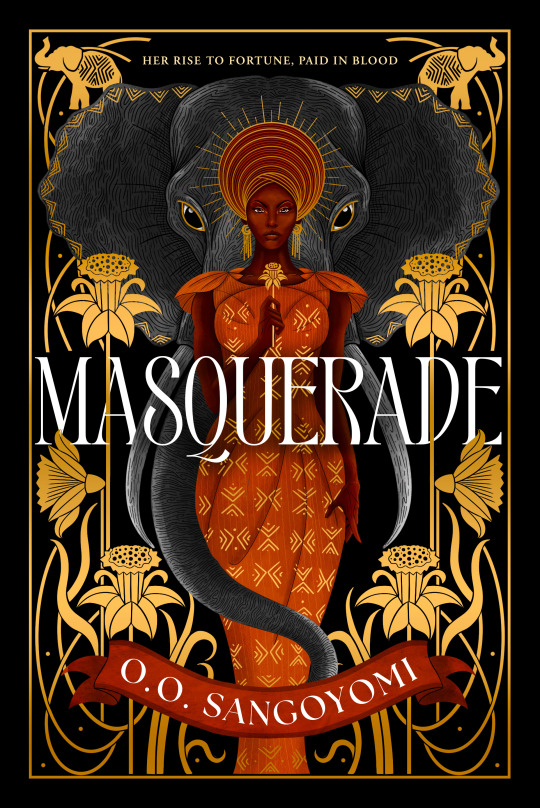
2024 reads / storygraph
Masquerade
historical fiction set in 15th century West Africa
follows a young woman from Timbuktu, recently conquered by the the warrior king of Yorùbáland
her guild of blacksmiths were already shunned as witches, and their conditions worsen under Yorùbá rule - so when she’s kidnapped by the king to be his wife, she decides to accept that it’ll be a better life for her, as long as she can get her mother’s blessing
but as months go by without her mother being found, and political tensions rise, she must decide what she wants
#masquerade#aroaessidhe 2024 reads#ahh... I enjoyed this in the beginning but I ended up being SO frustrated by the MCs decisions and inconsistencies.#click the storygraph link above to read all my thoughts tbh im not gonna copy everything in here#she’s like man this guy kidnapped me and is drugging me and treats me like an object and probably is lying about trying to find my mother :#well I should definitely try and uncover and tell him about this uprising happening under his nose so I can help him trust me!#she tells us she’s desperate for freedom and safety and autonomy and yet she’s doing so much to stay with this man who#she’s AWARE is NOT giving her autonomy AND she doesn’t give a fuck about anyone else’s freedom or autonomy?#she doesn’t even WONDER about the slave revolts or blacksmith strikes other than how can she stop them?#she’s naive and innocent but she’s also viewed as this brilliant military strategist and cunning at court politics#other than these moments she’s very naive and doesn’t make any obvious connections about what the other women#or her mother are up to (which considering the amount of speeches about men underestimating women she makes……okay)#thing is like there was some great setup to go in some really interesting directions!#if you wanted to go down the route of her goals making her singlemindedly ruthless and selfish and morally grey and rising to power#then commit to that! make her investigate the revolution and give her a reason to betray them anyway.#if you want to make it like she TRULY had no choice in becoming what she did (because any attempt to escape or connect#with the revolution had tragic consequences) then do that! But she like…..never tried anything.#She just accepted everything and tried to help the king because…I don’t even know!#if you like hades and perspephone you won’t like this. if you don’t like hades and persephone you won’t like this.#(i thought it had just been inaccurately compared to H&P - not written to reference H&P)#agh. it could have been good!
3 notes
·
View notes
Note
Since you've gone in depth in the past as to your reads of both Lotor and Zarkon's personalities and characteristics and how they differ from one another in both strategy and general outlook, I'm curious to hear what you think some of their big similarities might be? Lotor consistently feels the need to insist that he's not his father, and yet Haggar (who would arguably know the most about the two) said they're similar. Thoughts?
I would really hesitate to say that Haggar claiming Lotor is like Zarkon is actual evidence of their similarity.
You have to understand Haggar is a very manipulative person.
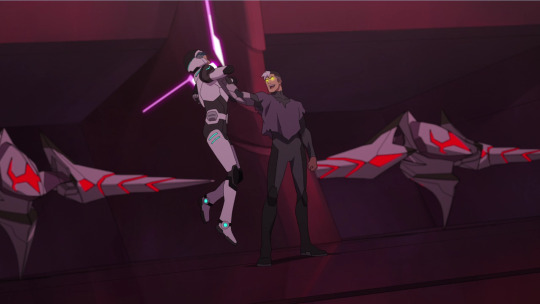
Remember this? Virtually all of Haggar’s tactics during s1e11 are not about using her incredible magical might to subdue or destroy Shiro immediately, or even quickly. There is nothing efficient about her fighting style.
What Haggar is doing here is an extensive, morbid psychological attack. She confronts Shiro with an image of himself, in prisoner’s rags, trying to kill him. She gets him at her mercy, several times, and uses it to pressure him to further stew in his discomfort and fear. She circles, she taunts. None of this indirection is actually necessary. We see Haggar immobilize Allura- a capable frontline fighter just like Shiro- effortlessly. If Haggar wanted to just overpower Shiro and be done with it, she could.
But there’s also what Haggar says to Shiro.
The way Haggar talks about it, you would think that she gave Shiro a gift out of the goodness of her heart and he spurned her benevolence and went on to hurt her.
That is not what happened. Shiro was her prisoner. She tortured him and experimented on him to the point of hacking off one of his limbs. And this is not Haggar being oblivious, either. Again- look at the expression on her face when she stabs Shiro.
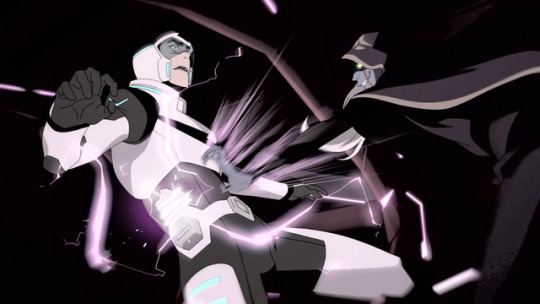
Look at her expression- wide eyes, toothy grin. She loves this. This scene, how it’s framed, what it looks like- this doesn’t feel like a battle. Again- Haggar has been holding back and toying with him. She’s been doing unnecessary things to scare Shiro, make him feel powerless and isolated.
Haggar willfully and consciously is framing what happened between her and Shiro as his fault. She talks about it as if she did nothing wrong, and that he’s the one creating a problem here. This is a textbook abuse tactic.
So what does this have to do with Lotor?
I think Haggar’s relationship to Lotor is a lot like her relationship to Shiro.
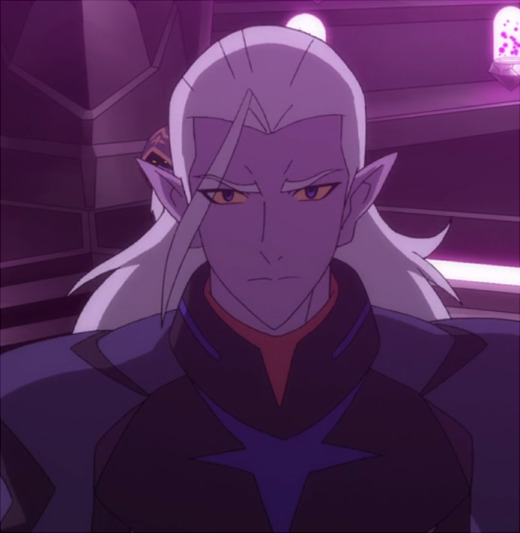
Look at the specific context around which Haggar says that Lotor is like Zarkon. This talk happened because Haggar assigned Raht, a full-grown, physically powerful and armed (he has a weaponized prosthetic) military commander, to stalk Lotor and report on his behavior.
Haggar is violating Lotor’s privacy and boundaries, without any reason whatsoever to be concerned or suspicious of him. She is telling- again, a powerful, dangerous older man- to stalk her adolescent son and tell her where he’s going.
Lotor captures Raht, kills him, and in a manner far more aggressive than he normally is, confronts Haggar about it.
And, just like in Shiro’s confrontation, Haggar’s immediate response is to talk about it in a way that sounds like it’s Lotor’s fault. Without addressing or even acknowledging that she’s making people follow Lotor, the first thing out of her mouth boils down to “you aren’t doing what you’re supposed to.”
The clear implication is that Lotor brought this on himself. That people dogging his tracks, not knowing when he is or is not being observed, and not being able to go where he wants to, are just natural consequences for not obeying mommy dearest.
Or: According to Haggar, Lotor’s privacy and autonomy is entirely contingent on whether or not he’s obedient. If he isn’t, he loses these things.
Haggar is using the same tactics she has used on her literal prisoners.
Lotor goes into this conversation practically snarling because this is what he’s used to. His hackles are already up because he anticipates her abuse before she even starts talking. And we see this color a lot of their interactions. In s4e3, Haggar greets Lotor neutrally and calmly, and asks that he follow her.
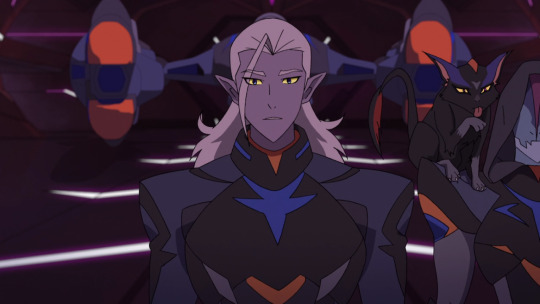
Lotor balks as soon as he sees her, and stares long and hard after her retreating back before he actually makes any move to follow. This is the behavior of someone who is scared, and went on high alert. Hell- the fact that he accurately predicted exactly what Zarkon wanted with him, but still didn’t want to go anywhere near his parents without backup should tell us something.
So- let’s get back to s3e5.
(First, with as much as there is to compare about Haggar’s treatment of Shiro vs. Haggar’s treatment of Lotor, I don’t think it’s a coincidence we see this first telling interaction between Lotor and one of his parents in the episode where Shiro is desperate, repeatedly hurt, and trying to crawl his way from the empire after they did something harmful to him)
“I know many ideas float through your head, just like your father.”
But everything Haggar is saying and suggesting here doesn’t back this up.
Zarkon doesn’t really get a lot of ideas. He’s pretty traditionalist- the person really scheming up new ways to do things is Haggar, and Zarkon’s more her patron than he is her peer scientifically. All he really cares about is results, and he’s content to repeatedly sledgehammer things until he gets his way.
And that’s the other thing: Haggar is comparing Lotor to Zarkon, at a point where she is functionally telling him to shut up and be a good little cog in the machine. She wants him to abandon what he wants, what he’s working on, and obediently maintain Zarkon’s status quo until Zarkon returns to the throne and Lotor can be put right back in his box where he belongs.
Haggar repeatedly changes tactics around Zarkon to carefully work around him because she knows, full well, that once Zarkon wants something he will never let it go. Zarkon hates being contradicted, challenged or anything like that.
Haggar saying Lotor is like Zarkon is facetious, because she claims they’re both thoughtful people when they aren’t, and she compares Lotor to Zarkon while demanding that Lotor behave like a subordinate- when Zarkon, given that same demand, would sooner kill the person asking it of him than even consider the idea.
It’s a shutdown. And I’d guess, it’s probably Haggar deliberately making Lotor uncomfortable so he won’t hold his ground in this argument. Because Lotor hates Zarkon, he hates being compared to Zarkon. He explodes immediately and then recoils and leaves. Which is probably just about what Haggar wanted him to do. She’s said her piece, so, now she wants him to shoo.
So I suppose at a glance you could say that Zarkon and Lotor are alike in that they’re both incredibly driven, but, even then, I would argue their contexts make that irreconcilable.
Because Zarkon’s drive boils down to entitlement. He is obscenely, egregiously entitled. Zarkon thinks the universe, the fabric of reality itself, owes him. That there is a massive debt that everything and everyone is constantly paying off to him. He has more than what he needs, he has everything he wants except Voltron, but he demands more, more, more, because none of it is never as much as what he thinks he deserves. If it exists, it is his, and he wants to take it.
Lotor’s drive is pretty simply because if he doesn’t succeed he’s going to die. Again, his parents are leveraging tactics against him similar to those used on Shiro- who Haggar considered a slave and an experiment. Lotor is viewed as a possession by these people, and if they want him at all, they want him to live in a little glass box and never do anything they don’t demand of him.
So yeah- both Zarkon and Lotor are very aggressive and focused on getting what they want. But Zarkon’s ambitions are grandiose to a hubristic degree.
Lotor’s ambitions are basically his own freedom and safety. It’s getting away from his abusers- and if he acts on a grandiose scale, it is because the sheer scope of Zarkon’s power forces him into a position where the only way Zarkon will ever hear him saying “no” is if Lotor becomes, or commands, a monster even Zarkon is afraid of.
He has to be bigger, he has to be tougher, he has to become something Zarkon can’t destroy because that’s the only way he’s ever going to survive.
Even when we see Lotor and Zarkon put in comparable situations, their responses just further emphasize the divide. Consider s3e7 vs. s4e3. Lotor and Zarkon, both have their teams, led by their “right hand”, turn on them.
Zarkon responded by denying any and all culpability, massacring his team, burning Altea to the ground and plunging the universe into ten thousand years of darkness.
Lotor, when hearing his team was literally going to turn him over to his abusers, responded that he understood, told them to do what they needed to, and then fled the situation in a manner where he could’ve probably injured Acxa and Ezor, and absolutely could’ve killed Zethrid, but didn’t fire a single shot after them. The only person he attacked, Narti, he perceived as endangering all of them, not just himself, and had no idea why, which is why it clearly unsettled him as much as he did- he didn’t offer any explanation because he had no explanation for what had just happened.
Someone like Zarkon would never have been at a loss for that. It would’ve been, and it was- very easy for him to immediately put the blame for the loss of Daibazaal on Alfor- when he himself was the one who left the rift open, destabilizing the planet and endangering everyone, and then forcing it even wider, until the only way it could be closed was by shattering the planet itself.
Lotor is silent on the matter of Narti, and when talking to Zethrid about the rest of the team leaving him, his dialogue tells us that he sees this as the generals just doing what they have to.
TL;DR:
Haggar is an unreliable narrator on purpose when talking to certain people. She said that to Lotor most likely because she knew it would hurt him to hear it.
I talk a lot about Lotor and Zarkon’s differences because their similarities as I see them are ultimately fairly superficial and driven by radically different undercurrents. They exist, but only to further characterize how massively different they are.
116 notes
·
View notes